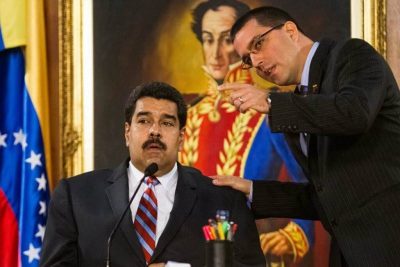To PM Justin Trudeau: EU Has Opened to Maduro, So How About Canada?

In a joint statement issued on July 2, Minister of Popular Power for Foreign Relations of Venezuela, Jorge Arreaza, and the High Representative of the European Union (EU) for Foreign Affairs, Josep Borrell agreed “on the need to maintain the framework of diplomatic relations, especially at times when cooperation between both parties can facilitate the paths of political dialogue,” according to a joint statement. Consequently, “the Venezuelan Government decided to nullify the decision made on June 29, 2020, whereby Ambassador Isabel Brilhante Pedrosa, Head of the Delegation of the European Union in Caracas, had been declared persona non grata.”
Due to the recurrent interventionist policy of the EU in the affairs of Venezuela, Ambassador Brilhante Pedrosa had been given 72 hours’ notice by President Maduro to leave the country.
The following is the full text of the joint communiqué:
“Joint communiqué after the phone call between EU High Representative Borrell and Minister Arreaza.
Brussels, 02/07/2020.
The Ministry of People’s Power for Foreign Affairs of the Bolivarian Republic of Venezuela and the European Union’s External Action Service inform the international community that today, the Venezuelan Minister of People’s Power for Foreign Affairs, Jorge Arreaza, and the European Union’s High Representative for Foreign Affairs and Security Policy, Josep Borrell, held a phone conversation in which they agreed on the need to maintain the framework of diplomatic relations, especially at times when cooperation between both parties can facilitate the path of political dialogue.
Consequently, the Venezuelan Government decided to rescind the decision taken on June 29, 2020, by which Ambassador Isabel Brilhante Pedrosa, Head of the Delegation of the European Union in Caracas, was declared persona non grata.
They both agreed to promote diplomatic contacts between the parties at the highest level, within the framework of sincere cooperation and respect for international law.”
In an interview with Caracas-based news network TeleSur, Arreaza said he held a “very frank, very sincere and at the same time very cordial” conversation with Borrell on Wednesday. Arreaza said the joint communique “is a clear sign of recognition, in diplomatic terms,” of the government of President Nicolás Maduro.
The Trudeau government has worked very closely with the EU in its joint efforts for regime change in Venezuela by recognizing the U.S. appointed Juan Guaidó as so-called interim president. This was based on the false and unconstitutional premise that he was president of the National Assembly. For example, on June 3, 2019:
“the foreign ministers of Canada, Chile and Peru—members of the Lima Group—together with the High Representative of the EU and the foreign ministers of Portugal and Uruguay—members of the International Contact Group—met today at the United Nations in New York to discuss the situation in Venezuela. They reiterated their backing for the democratically elected National Assembly and affirmed the need to fully restore and respect its powers, as well as to release all political prisoners.”
Thus, given this tradition of working in lock-step with the EU, will Canada now follow its lead and, in the words of the Venezuela-EU joint statement, promote diplomatic contacts between the parties at the highest level, that is to say, Canada and Venezuela?
This demand is even more pertinent since June 17, 2020 when the Trudeau government lost its bid for the United Nations Security Council (UNSC) seat. The general consensus has been that the Trudeau government’s defeat resulted from being far too close to the Trump administration’s foreign policy on all issues. Among the many bones of contention leading up to the vote were Palestine and Venezuela. In conjunction with other organizations, it was the Canadian Foreign Policy Institute which spearheaded the successful #NoUNSC4Canada campaign and it is now calling for public discussion, reassessment and a #ForeignPolicy Review.
The news about the mutual diplomatic “thaw” between the EU and the Venezuelan government puts a similar softening on the agenda for Canada-Venezuela relations, which should follow suit. It is an opportunity for PM Trudeau to mend his post-UNSC ways by showing that he wants to be part of the public debate on foreign policy, and is part of the solution rather than the problem. Of course, taking note of this EU-Venezuela “détente” and acting on it would entail Trudeau standing up to Trump. So, be it. In any case, this was the issue in the UNSC elections when Canada lost its pro-Trump “mandate” both in Canada and internationally. Trudeau must now react appropriately.
*
Note to readers: please click the share buttons above or below. Forward this article to your email lists. Crosspost on your blog site, internet forums. etc.
This article was originally published on The Canada Files.
Featured image is from Alberto News / Google Images

